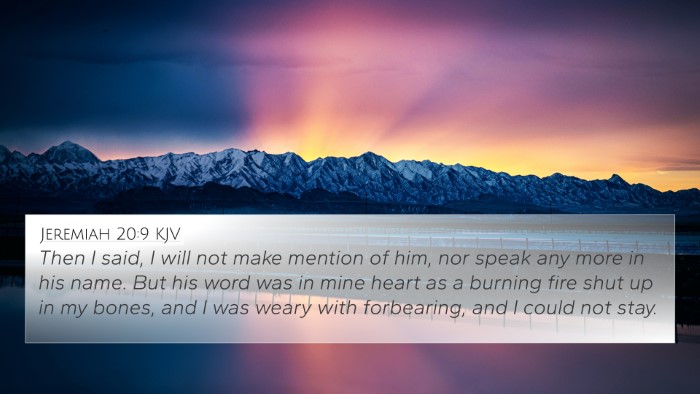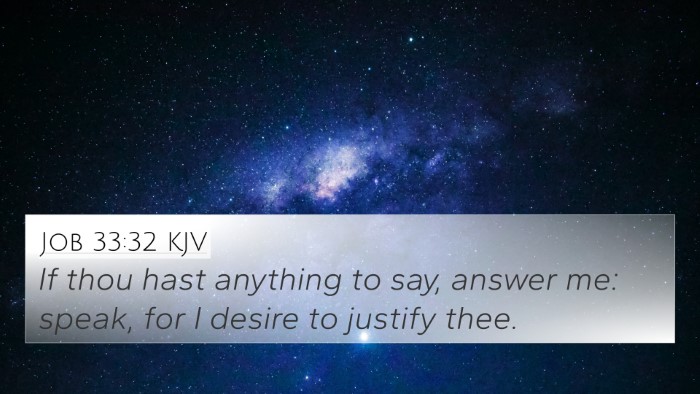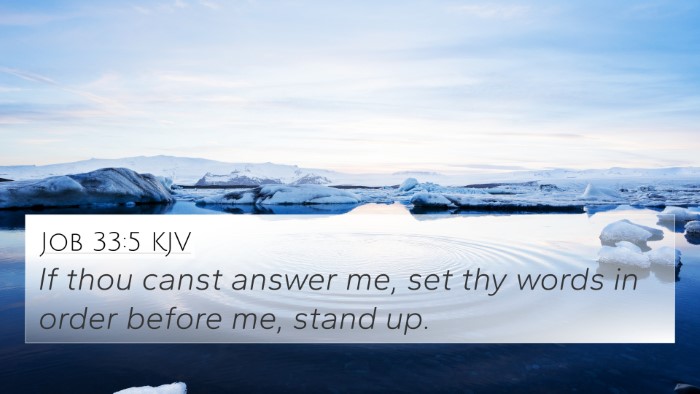Old Testament
Genesis Exodus Leviticus Numbers Deuteronomy Joshua Judges Ruth 1 Samuel 2 Samuel 1 Kings 2 Kings 1 Chronicles 2 Chronicles Ezra Nehemiah Esther Job Psalms Proverbs Ecclesiastes Song of Solomon Isaiah Jeremiah Lamentations Ezekiel Daniel Hosea Joel Amos Obadiah Jonah Micah Nahum Habakkuk Zephaniah Haggai Zechariah MalachiJob 13:19 Similar Verses
Job 13:19 Cross References
Who is he that will plead with me? for now, if I hold my tongue, I shall give up the ghost.
Uncover the Rich Themes and Topics of This Bible Verse
Listed below are the Bible themes associated with Job 13:19. We invite you to explore each theme to gain deeper insights into the Scriptures.
Job 13:19 Cross Reference Verses
This section features a detailed cross-reference designed to enrich your understanding of the Scriptures. Below, you will find carefully selected verses that echo the themes and teachings related to Job 13:19 KJV. Click on any image to explore detailed analyses of related Bible verses and uncover deeper theological insights.

Isaiah 50:7 (KJV) »
For the Lord GOD will help me; therefore shall I not be confounded: therefore have I set my face like a flint, and I know that I shall not be ashamed.

Job 7:11 (KJV) »
Therefore I will not refrain my mouth; I will speak in the anguish of my spirit; I will complain in the bitterness of my soul.

Job 10:8 (KJV) »
Thine hands have made me and fashioned me together round about; yet thou dost destroy me.

Jeremiah 20:9 (KJV) »
Then I said, I will not make mention of him, nor speak any more in his name. But his word was in mine heart as a burning fire shut up in my bones, and I was weary with forbearing, and I could not stay.

Romans 8:33 (KJV) »
Who shall lay any thing to the charge of God's elect? It is God that justifieth.
Job 13:19 Verse Analysis and Similar Verses
Understanding Job 13:19
Verse: "Who is he that will plead with me? for now, if I hold my peace, I shall give up the ghost."
Summary and Interpretation
The verse from Job 13:19 reflects Job’s profound sense of isolation and the challenge he faces in presenting his case before God. Job is aware of his suffering and injustice, yet feels overwhelmed when considering how to defend himself. This sense of desperation is a pivotal point in Job’s dialogue about faith, suffering, and divine justice.
Commentary Insights
- Matthew Henry: Henry emphasizes Job's courage in facing God, contrasting it with the timidity cased by his suffering. Job's rhetorical question highlights his feeling that he has no mediator to speak on his behalf, reinforcing his loneliness in suffering.
- Albert Barnes: Barnes points out that Job is articulating the futility he senses in pleading his case. He recognizes God’s ultimate authority and is aware that no one can confront God on his behalf. Here, Job's earnest search for understanding and justice stands out.
- Adam Clarke: Clarke elaborates on the isolation Job feels, suggesting that his plea is deeply rooted in his desire for a fair hearing. He illustrates Job’s inner turmoil and stark acknowledgment of mortality when he mentions, "I shall give up the ghost."
Key Themes and Related Concepts
This verse touches upon themes of:
- The quest for justice: Job's longing for accountability from God represents a fundamental human desire for justice in suffering.
- The struggle with faith: Job’s doubt and despair illustrate a common struggle of believers in difficult times.
- The role of a mediator: Job’s yearning for someone to plead on his behalf opens discussions about the necessity of intercessors in faith.
Cross-References
To gain a deeper insight into this verse, here are some related Bible verses that offer thematic connections:
- Job 9:33 - "Neither is there any daysman betwixt us, that might lay his hand upon us both." - Highlights Job's desire for a mediator.
- Hebrews 4:14 - "Seeing then that we have a great high priest..." - Reflects the concept of Christ as our mediator.
- 1 Timothy 2:5 - "For there is one God, and one mediator between God and men, the man Christ Jesus." - Affirms the vital role of Jesus as a mediator.
- Psalms 55:17 - "Evening, and morning, and at noon, will I pray, and cry aloud..." - Emphasizes consistent prayer amid despair.
- Romans 8:34 - "It is Christ that died, yea rather, that is risen again..." – Reminds us of Christ's intercession for believers.
- Job 16:21 - "O that a man might plead with God, as a man pleadeth with his neighbor!" - Job’s longing for advocacy.
- 2 Corinthians 5:10 - "For we must all appear before the judgment seat of Christ..." - Signifies accountability before God, echoing Job's concerns.
Concluding Thoughts
This verse serves as a profound expression of Job's anguish and wish for divine interaction. The exploration reveals a deeper understanding not only of Job's plight but also of the broader biblical theme of seeking justice and understanding in suffering. The cross-references provide a wider context of intercessory roles throughout the scriptures.






